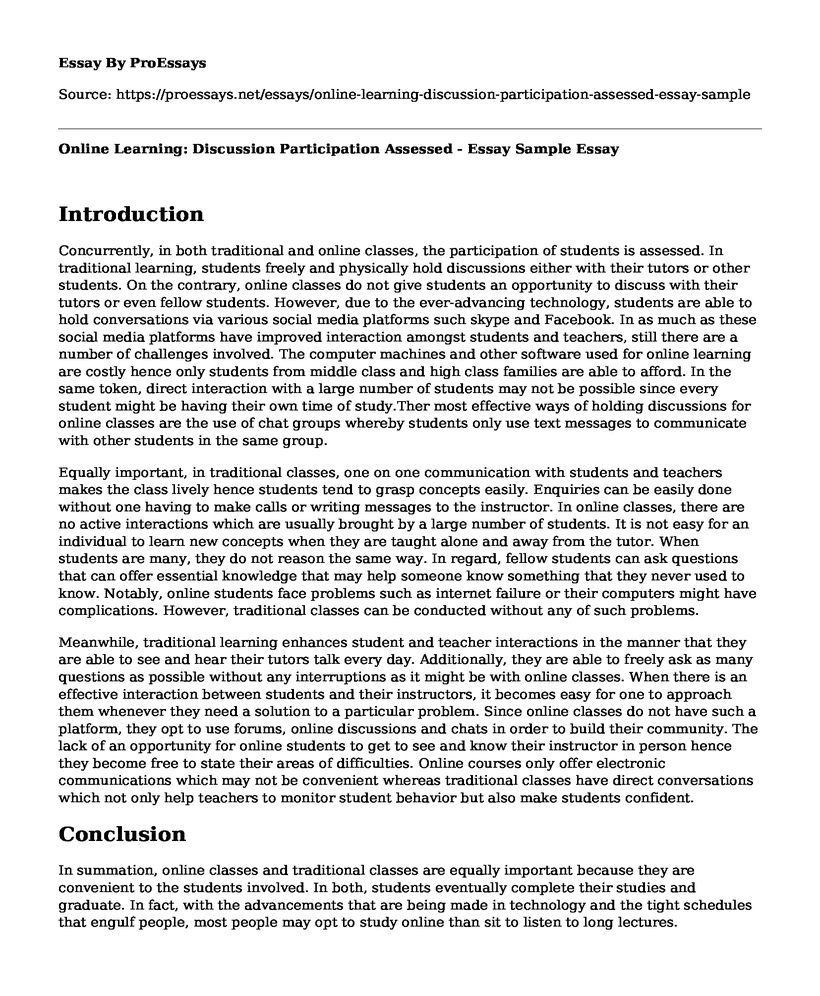Introduction
Concurrently, in both traditional and online classes, the participation of students is assessed. In traditional learning, students freely and physically hold discussions either with their tutors or other students. On the contrary, online classes do not give students an opportunity to discuss with their tutors or even fellow students. However, due to the ever-advancing technology, students are able to hold conversations via various social media platforms such skype and Facebook. In as much as these social media platforms have improved interaction amongst students and teachers, still there are a number of challenges involved. The computer machines and other software used for online learning are costly hence only students from middle class and high class families are able to afford. In the same token, direct interaction with a large number of students may not be possible since every student might be having their own time of study.Ther most effective ways of holding discussions for online classes are the use of chat groups whereby students only use text messages to communicate with other students in the same group.
Equally important, in traditional classes, one on one communication with students and teachers makes the class lively hence students tend to grasp concepts easily. Enquiries can be easily done without one having to make calls or writing messages to the instructor. In online classes, there are no active interactions which are usually brought by a large number of students. It is not easy for an individual to learn new concepts when they are taught alone and away from the tutor. When students are many, they do not reason the same way. In regard, fellow students can ask questions that can offer essential knowledge that may help someone know something that they never used to know. Notably, online students face problems such as internet failure or their computers might have complications. However, traditional classes can be conducted without any of such problems.
Meanwhile, traditional learning enhances student and teacher interactions in the manner that they are able to see and hear their tutors talk every day. Additionally, they are able to freely ask as many questions as possible without any interruptions as it might be with online classes. When there is an effective interaction between students and their instructors, it becomes easy for one to approach them whenever they need a solution to a particular problem. Since online classes do not have such a platform, they opt to use forums, online discussions and chats in order to build their community. The lack of an opportunity for online students to get to see and know their instructor in person hence they become free to state their areas of difficulties. Online courses only offer electronic communications which may not be convenient whereas traditional classes have direct conversations which not only help teachers to monitor student behavior but also make students confident.
Conclusion
In summation, online classes and traditional classes are equally important because they are convenient to the students involved. In both, students eventually complete their studies and graduate. In fact, with the advancements that are being made in technology and the tight schedules that engulf people, most people may opt to study online than sit to listen to long lectures.
Works Cited
Woodard, Bobby R., and Jim B. Fatzinger. "Student Engagement with Other Students." New Directions for Teaching and Learning, vol. 2018, no. 154, 2018, pp. 99-107. http://eds.b.ebscohost.com/eds/detail/detail?vid=2&sid=99e2fadb-508b-4430-bec0-23243a6a1579%40pdc-v-sessmgr05&bdata=JnNpdGU9ZWRzLWxpdmUmc2NvcGU9c2l0ZQ%3d%3d#AN=128361606&db=tfh. Accessed 21 September 2019.
Harbour, Kristin E., et al. "A Brief Review of Effective Teaching Practices That Maximize Student Engagement." Preventing School Failure: Alternative Education for Children and Youth, vol. 59, no. 1, 2014, pp. 5-13. http://eds.b.ebscohost.com/eds/detail/detail?vid=86&sid=8e81c90c-bd36-484c-93a8-92cf1cbb7461%40sessionmgr101&bdata=JnNpdGU9ZWRzLWxpdmUmc2NvcGU9c2l0ZQ%3d%3d#AN=98026277&db=fth. Accessed 21 September 2019.
Blitz, Cynthia L. "Can Online Learning Communities Achieve the Goals of Traditional Professional Learning Communities? What the Literature Says." National Center for Education Statistics (NCES) Home Page, a Part of the U.S. Department of Education, 18 Sept. 2013, https://nces.ed.gov/PUBSeARCH/pubsinfo.asp?pubid=REL2013003. Accessed 21 September 2019.
Hughes, John, et al. "How the REL Program Communicates with Stakeholders." 1 Aug. 2017, https://nces.ed.gov/forum/pdf/S2017_REL_NESAC.pdf. Accessed 22 September 2019.
Cite this page
Online Learning: Discussion Participation Assessed - Essay Sample. (2023, Feb 20). Retrieved from https://proessays.net/essays/online-learning-discussion-participation-assessed-essay-sample
If you are the original author of this essay and no longer wish to have it published on the ProEssays website, please click below to request its removal:
- My Avalanche of Kindness Essay Example
- Paper Example on Instructions That Improves Learning Outcomes in University Students
- Research Paper on Negative Impact of Standardized Testing in Texas
- Violence in Video Games Effect on Children Essay Example
- Bilingual vs. Monolingual Children: Examining Working Memory Performance - Essay Sample
- Essay Exampe on Bullying Among Children: Power and Social Status Dynamics
- Paper on Interns Should Be Paid For Their Work







